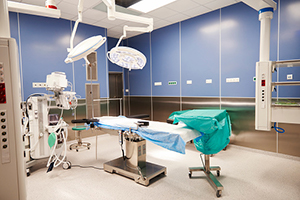The American College of Surgeons (ACS) has released a new surgical resource document, “Local Resumption of Elective Surgery Guidance,” as a guide for health-care facilities preparing to resume elective surgery once COVID-19 has peaked in their area.

Photo credit: Getty
Health-care facilities have been allocating their resources to care for critically ill patients with COVID-19 since the Centers for Medicare & Medicaid Services, ACS, and other organizations issued a mid-March call to curtail elective procedures in the midst of the rising pandemic. Since then, elective operations have been postponed or canceled, and many facilities are now looking ahead to prepare to safely resume these procedures for patients whose medical conditions warrant surgical treatment.
ACS recognizes that the effect of the COVID-19 pandemic on local communities or facilities is a spectrum and therefore suggests that facilities use the guidance document to ensure several pertinent issues have been considered before elective surgery resumes at a facility. It’s important for facilities to first check compliance with their state's executive orders and regulations as well.
ACS offers a set of principles and issues to help local facilities plan for resumption of elective surgical care and states in the document, “Understanding both the local facility capabilities (eg, beds, testing, operating rooms) as well as potential constraints (eg, workforce, supply chain), while keeping an eye on potential subsequent waves of COVID-19 [infections] will continue to be important.”
Ten distinct issues—in four categories—are presented in the document that need to be addressed at the local level before elective surgery may be resumed safely:
- COVID Awareness: Addresses knowing the community’s COVID-19 numbers, including prevalence, incidence, and isolation mandates, and knowing COVID-19 diagnostic testing availability and policies for patients and health-care workers.
- Preparedness: Addresses personal protective equipment policies, health-care facility capacity (beds, intensive care unit, ventilators) including expansion plans, adequate operating room supply chain/support areas, workforce staffing issues, and the role of a governance committee.
- Patient Issues: Addresses patient communication and prioritization of a protocol/plan.
- Delivery of Safe High-Quality Care: Addresses ensuring safe, high-quality, high-value care of the surgical patient across a continuum of Five Phases of Care.
Although this document provides principles to help local facilities safely resume procedures after COVID-19 peaks locally, there is still much work to be done. While COVID-19 cases may have peaked in certain areas, the virus is still circulating and there is much we don’t know about the etiology and progression of the disease. To address this problem, the ACS has developed the ACS COVID-19 Registry, which is now available to all hospitals willing to capture meaningful data about patients with COVID-19 they treat.

